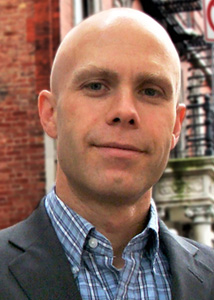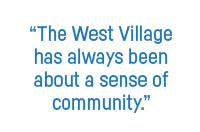 Andrew Berman has been Executive Director of Village Preservation (formerly GVSHP) since 2002. Berman was born in the Bronx and grew up in Co-Op City. In 2013, he was named to the Vanity Fair “Hall of Fame” for his preservation work. Berman attended Bronx High School of Science and then Wesleyan University, where he received a degree in Art History with a focus on architecture.
Andrew Berman has been Executive Director of Village Preservation (formerly GVSHP) since 2002. Berman was born in the Bronx and grew up in Co-Op City. In 2013, he was named to the Vanity Fair “Hall of Fame” for his preservation work. Berman attended Bronx High School of Science and then Wesleyan University, where he received a degree in Art History with a focus on architecture.
Growing up in the Bronx, Andrew Berman became aware at an early age of the perils of big public projects. “My mother’s family lived in one of the first apartment buildings demolished by Robert Moses to make way for the Cross Bronx Expressway,” he says. “I heard a lot about that. There was definitely a consciousness about how that and other projects by Moses destroyed neighborhoods. My father was a hardware salesman who spent his days driving throughout the five boroughs and sometimes I would go with him. He had a very broad knowledge of the City: its different areas, what they were like, who lived there, and how they had changed. I think I absorbed a lot of that from him and, no doubt, my parents influenced my interest in preservation.”
It wasn’t long after college that Berman started an eight-year tenure with New York politician Tom Duane, who represented Greenwich Village, among other neighborhoods. It was, he admits, experience that turned out to be “incredibly useful” in his current position. “In order to be successful in New York City—in terms of historical preservation—you have to bring together both knowledge and history of the built environment,” he says. “You also need to be effective at community organizing and understand how the levers of government affect these issues. You could have the most wonderfully argued and researched proposal for landmarking a building, but if you don’t know how to organize people to lobby for it or understand how the system works in terms of the decision-making process, you’re not very likely to be successful.”
Last year, GVSHP became Village Preservation to better reflect its mission. “We shortened and broadened the name to reflect the fact that we serve Greenwich Village and the East Village too,” Berman explains. “And because our mission now extends beyond what you would traditionally call historical preservation to small business and cultural institution preservation as well. It was kind of an organic extension because these were things we cared about.” As to his leadership of Village Preservation, Berman claims that it’s a “dream job.” “I actually get to do something that I love as my job and as the main focus of my professional life,” he says. “I find the history, architecture, and culture of our neighborhoods to be wonderful. And I’m still learning new things. There are more layers to be peeled back and more information to be found. Finally, I get to work with a really engaged community that cares about things.”
 Since this is WestView, we encouraged Berman to express any special feelings about our neighborhood in particular. “I love the West Village,” he readily admits. “It remains one of the most unique, charming, magical places not just in New York, but in the world. It faces incredible challenges, though, from enormous development pressure to the fact that it’s become so incredibly expensive. I guess that’s a validation that it is so desirable, which is what we’ve fought for. But you also don’t want it to become a place that doesn’t remain accessible to the broader world. I think many of the new residents, as much as the old, feel that way too. No one is moving here because they want to be barricaded from the rest of the world. They move here because there’s a community that’s a mixture of people, activities, places to shop, and things to do and learn.”
Since this is WestView, we encouraged Berman to express any special feelings about our neighborhood in particular. “I love the West Village,” he readily admits. “It remains one of the most unique, charming, magical places not just in New York, but in the world. It faces incredible challenges, though, from enormous development pressure to the fact that it’s become so incredibly expensive. I guess that’s a validation that it is so desirable, which is what we’ve fought for. But you also don’t want it to become a place that doesn’t remain accessible to the broader world. I think many of the new residents, as much as the old, feel that way too. No one is moving here because they want to be barricaded from the rest of the world. They move here because there’s a community that’s a mixture of people, activities, places to shop, and things to do and learn.”
So, does Berman feel the influx of monied residents into the Village will allow it to stay true to what makes it such a special place? “Certainly some people of great means who move into the neighborhood aren’t really invested in the wonderful qualities of the community,” he says. “And then there are those who very much are. Regarding preservation, though, there can be good and bad outcomes from the investment of money and there can be good and bad outcomes from the lack of money. I don’t think money is by itself either the problem or the solution. Rather, it’s how it’s used. The West Village has always been about a sense of community. Maintaining this, along with a level of diversity, is definitely important to the soul of the neighborhood.”
Photo: GVSHP
